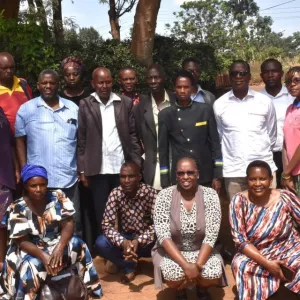Radio Listeners Clubs Boosts Climate Resilience for Bean Farmers in Tanzania
In Tanzania, where agriculture sustains the livelihoods of many communities, the impacts of climate change – such as recent prolonged drought spells and extreme floods experienced across East Africa – are increasingly felt by farmers. These extreme weather events threaten crop yields and food security, highlighting the urgent need for localized and accurate climate information to help farmers adapt. Like

Radio Listeners Clubs Boosts Climate Resilience for Bean Farmers in Tanzania
In Tanzania, where agriculture sustains the livelihoods of many communities, the impacts of climate change – such as recent prolonged drought spells and extreme floods experienced across East Africa – are increasingly felt by farmers. These extreme weather events threaten crop yields and food security, highlighting the urgent need for localized and accurate climate information to help farmers adapt.
Like their counterparts in other East African countries, Tanzanian farmers often struggle with access to relevant weather and climate information, hindering their ability to effectively manage risks associated with bad or poor weather in a cropping season for better agricultural production. Drawing inspiration from the success of a similar initiative in Rwanda, where over 100,000 farmers are being reached with Weather and Climate Information Services (WCIS), the Enhancing Climate Resilience in East Africa (ECREA) project is pioneering a transformative approach to disseminating WCIS in Tanzania through Radio Listeners Clubs. At the forefront of this initiative is Radio Huguka from Rwanda and FADECO radio, a community radio station with an audience of over 7 million people in Tanzania.
Recently, during a Participatory Integrated Climate Services for Agriculture (PICSA) workshop in Karagwe and Kigoma region, FADECO radio – a key partner in the ECREA project – benefited from the interactive workshop training sessions held on the sidelines of the main event. Participants from FADECO radio were trained by their counterparts from Radio Huguka on establishing Radio Listeners Clubs across the Great Lake Victoria region of Tanzania. These clubs will feature multidisciplinary members and ensure gender inclusion. Other activities are scheduled for implementation in the subsequent quarters to enhance discussions and co-produce content tailored to local needs.
ECREA is leveraging the successful model piloted in Rwanda, where Listeners Clubs harness the combined reach of broadcast media and participatory processes. In this model, 225 clubs were created, and Farmer Promoters/Champions were trained to lead weekly village meetings where they listened to and discussed climate information service radio programs. They actively participated in live call-in shows, shared and recorded their action plans based on their learnings, and disseminated this information within their communities. This approach is being adapted to enhance climate information dissemination and resilience efforts in Tanzania.

